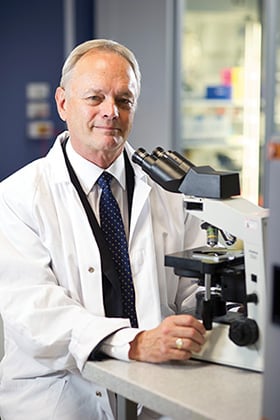
For Laureate Professor John Aitken, leader of a 50-strong research team studying reproductive science, curing infertility and creating better methods of contraception are the two single most important issues facing the world.
For Laureate Professor John Aitken, leader of a 50-strong research team studying reproductive science, curing infertility and creating better methods of contraception are the two single most important issues facing the world.
“Each year the reproductive needs of some 120 million couples worldwide go unmet,” Professor Aitken said.
“I believe that finding more effective ways to control fertility is a critical global issue while, at an individual level, we should never forget the large number of couples seeking safe, effective solutions to their infertility.
“Essentially, all the world’s problems are, one way or the other, connected to sustainable world population growth. If we get control of populations numbers, we can solve many of the difficulties facing mankind.”
The 2012 NSW Scientist of the Year has devoted his career to assisting those with fertility issues, his speciality being the largely neglected field of male reproduction.

While working at the University of Edinburgh in the late 1980s Professor Aitken uncovered a major cause of male infertility – ‘free radicals’ generated by smoking, obesity and age could attack sperm DNA.
Today, thousands of men with infertility problems take antioxidants – the treatment against free-radical generation.
More recently he has developed a method for selecting the best sperm to make in-vitro fertilisation faster and more accurate. Currently in Australia, one in 30 children are born from Assisted Reproductive Technology (ART).
Professor Aitken’s research led to the development of a sperm separating device called the CS10, which is set for a commercial launch in 2015.
At the same time, a world-first female contraception developed by Professor Aitken’s research group, which simultaneously paralyses sperm and protects from sexually-transmitted diseases, is currently undergoing safety trials.
He says the 46 million abortions performed worldwide every year, including 70,000 in Australia, are not just a moral failure but a contraception failure.
“We live in strange times in having this strange dichotomy between people who are desperate to have pregnancies and those who are aborting their pregnancies,” he said.
HMRI would like to acknowledge the Traditional Custodians of the land on which we work and live, the Awabakal and Worimi peoples, and pay our respects to Elders past and present. We recognise and respect their cultural heritage and beliefs and their continued connection to their land.

Hunter Medical Research Institute
We’re taking healthy further.
Locked Bag 1000
New Lambton
NSW, Australia, 2305



This site is protected by reCAPTCHA and the Google Privacy Policy and Terms of Service apply.
Copyright © 2024 Hunter Medical Research Institute | ABN: 27 081 436 919
Site by Marlin Communications
